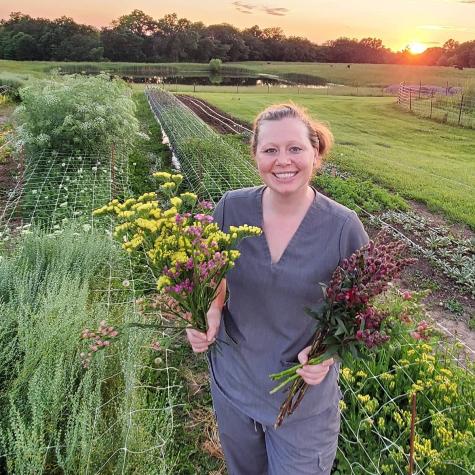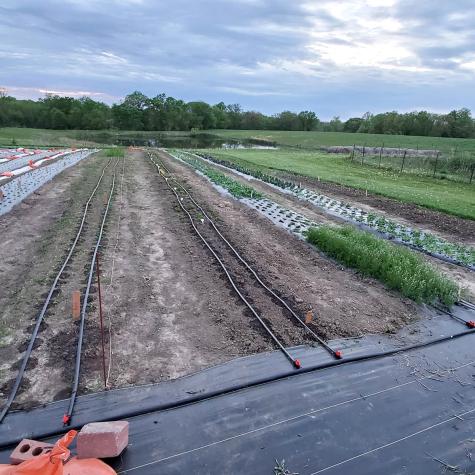HUNTSVILLE, Mo. – When Amanda Quinn quadrupled the growing space at her Randolph County flower farm, she didn’t want to quadruple the time spent watering flowers.
Quinn, owner of “bloom: Cut Flower Farm,” contacted University of Missouri Extension specialist Dan Downing for advice about drip irrigation systems. She had attended an MU Extension demonstration of a drip irrigation system last year at a flower farm in La Plata.
In drip irrigation systems, tubes take water to plants in a slow, consistent stream above the soil surface or at the root zone. The system saves water, improves plant growth, reduces runoff and lessens disease, Downing says.
Downing helped Quinn and her husband, Lane, choose the right type of system and equipment. He also is working with them to help them capture rainwater instead of relying on rural water to irrigate the flowers.
In August, Quinn’s flower farm hosted a tour of the irrigation system that drew more than 60 people from nine counties. The tour was coordinated by MU Extension horticulturist Jennifer Schutter and funded by the Missouri Department of Agriculture’s Specialty Crops Program.
Quinn is one of a growing number of Missouri cut flower farmers dedicated to staging a comeback of locally grown flowers. More than 80% of cut flowers sold in the United States come into the Miami International Airport from other countries, primarily Colombia, according to the U.S. Department of Agriculture.
The journey from field to vase wastes natural resources, says Quinn. Newly arrived flowers are stored in refrigerated facilities before traveling by truck to wholesalers and retailers. Foreign growers preserve them with chemicals to keep them fresh during their long treks.
Quinn says local flowers are fresher and support local small businesses. She uses beneficial insects such as ladybugs and green lacewings for natural pest control. She doesn’t want to harm butterflies and native bees that inhabit her farm.
The Quinns, both MU graduates, bought their property near Huntsville about six years ago. A 3-acre field behind their house was ideal for a project such as the flower farm.
They pick flowers on Fridays and Saturdays and sell at Orr Street Farmers and Artisans Market in Columbia on Sundays. They also supply florists in Macon, Glasgow, Fayette and Salisbury. They take bouquets weekly to Randolph County Mercantile in Moberly and accept special orders for individuals and businesses.
“I like working with other small businesses to support the local economy,” she says.
Time is the most limiting factor in Quinn’s quest to take seeds to centerpieces. In addition to working full-time, she and her husband spend another 40 hours a week developing the cut flower business.
She wants to add more beds and a seasonal subscription service next year as she grows beauty in the heartland. She hopes to improve other aspects of her business by working with MU Extension specialists in business, horticulture and forestry.
Follow “bloom: Cut Flower Farm” at Facebook.
Photos available:
Amanda Quinn holding cut flowers
Amanda Quinn’s cut flower farm sells bouquets to farmers markets, directly to customers and to florists. She recently hosted a tour of her farm, which uses a drip irrigation system recommended by University of Missouri Extension specialist Dan Downing. Photo courtesy of Amanda Quinn.
Drip irrigation system
Drip irrigation systems save time and provide a slow, consistent water flow to plants at Amanda Quinn’s flower farm near Huntsville. She quadrupled her growing space this year. Photo courtesy of Amanda Quinn.

